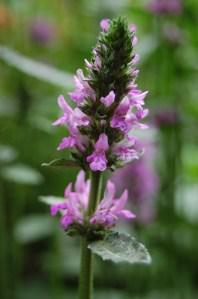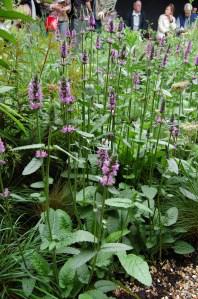
Stachys officinalis ‘Hummelo’ flower (10/07/2011, London)
Position: Full sun to partial shade
Soil: Well drained soil
Flowering period: Summer
Eventual Height: 60cm
Eventual Spread: 45cm
Hardiness: USDA Zone 4a-9b
Family: Lamiaceae
Stachys officinalis ‘Hummelo’ is a deciduous perennial with a mat-forming habit. Its leaves are mid green in colour, oval to oblong and have round-toothed margins. Above this mat of foliage rise whorls of hooded, tubular, hooded, white or pink, monoecious flowers, which are borne on stout, sturdy stems in summer.
S. officinalis, commonly known as Betony, Purple Betony, Wood Betony, Lousewort or Bishopwort, is native to much of Europe, including Britain. It was traditionally used in the treatment of a wide range of disorders and is believed to have been mainly used for maladies of the head, from headaches to lacerations. In its natural habitat it is found in wild grasslands.
Stachys is derived from the Greek meaning ‘an ear of grain’, referring to the spike of flowers, with officinalis being a Latinised word used in the Linneal binomial system to denote a plant that had a pharmacological usage, derived from the medieval word Officina, meaning apothecary.

Stachys officinalis ‘Hummelo’ (10/07/2011, London)
The landscape architect may find this plant useful as a low maintenance herbaceous perennial. It looks good when planted en mass and is suitable for prairie style planting.
This plant will tolerate almost any soil conditions; it will be happy at neutral, acid or alkaline pH levels, in loam, chalk or sand based soils facing any sheltered or exposed aspect. It is also drought tolerant once established and will tolerate salty coastal conditions.
As a native flowering plant it will have a large positive ecological impact and is known to attract large numbers of honey bees and many butterflies such as the Brimstone, Green-veined White, High Brown Fritillary, Marsh Fritillary, Peacock, Small Skipper, Small Tortoiseshell and White Admiral.
Maintenance: This plant requires no maintenance. This plant may be divided in early spring when clumps become too large.

